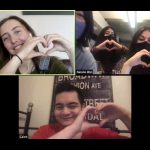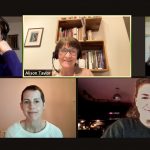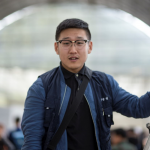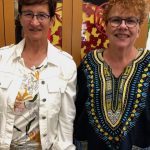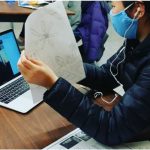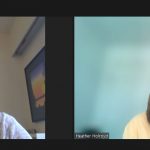By Alison Taylor
Between them, Betsy Alkenbrack and Lucy Alderson have been adult educators for over half a century. After doing community based literacy and anti-apartheid work in Toronto, Betsy worked in South Africa in English-as-a-second language, voter education, and teacher training. Lucy was active in the women’s movement across BC with a particular interest in women’s work, and also worked for years to establish a women’s emergency shelter in Vancouver. Both now work as instructors in the Community Development and Outreach Department at Capilano University.
These experiences shape how they now approach adult literacy education in their work at Learning Centres at Carnegie Community Centre (corner of E Hastings and Main) and WISH Drop-in Centre.[1] We met them at the very busy Carnegie site to talk about their work in community.
‘The personal is political’ was a rallying cry of feminists in the 1970s. It continues to influence their work. Lucy talks about literacy in terms of how people are able to participate in society—“how are they feeling about speaking up, how do they feel they fit in to the community, where do they want to be going”? That’s a very different approach from a narrow focus on how someone’s doing on her math.
This reminds me of the capabilities approach of Harvard economist and philosopher Amartya Sen, which expands narrow ways of measuring economic prosperity to include an evaluation of social well being. In accord, poverty is not just about low income, but also about lacking opportunities to live good lives.[2] Educational change is needed to expand the capabilities of individuals and communities. And that’s not just up to adult educators in the downtown eastside (DTES).
It’s up to other educational institutions. But one of the problems with rankings-conscious universities like UBC engaging in low-income communities, is that their commitments are often limited term and self-serving. Institutionally, such universities are more likely to seek out partnerships with well-resourced organizations that bring in research dollars than with non-profits. And while some faculty members have forged strong relationships with community organizations, they’re the exception rather than the rule.
Betsy talks about the revolving door of community-engaged UBC students with concern, “One of the things we’ve found is that a student placement always has to go around the [university] student’s needs. They’ve got 3 weeks or 6 weeks and they’ve got to do this. And they expect us to spend quite a lot of time with them. … And so they’re never that much use to us…. It’s our job to support our students and that has to come first.”
The Learning Exchange provides a model of partnerships that are more reciprocal within UBC. Betsy and Lucy agree that it has been effective in balancing the needs of students and the community. Perhaps as a result of the support students receive, including orientation to the DTES community, students from LE tend to be “very involved and helpful.”
Like Betsy and Lucy and Capilano University, LE staff have taken time to listen and to build trust in the community—they’re in it for the long haul and for the bad times as well as good. And they know how the university functions. As a result, they play a critical role in helping students and instructors become effective boundary-crossers between UBC and the DTES.
That doesn’t let UBC or individual instructors off the hook, however. Community knowledge needs to be valued more. The community needs more control over how research is undertaken and disseminated.[3] And the university, for all its talk about solving “wicked problems,” needs to find ways to provide greater access to higher education for more students.
[1] These Learning Centres are provided through Betsy and Lucy’s department at Capilano University.
[2] See discussion about capabilities in: McLean, M., & Walker, M. (2010). Making lives go better: university education and professional capabilities. South African journal of higher education, 24(5), 847-869.
[3] The LE has played a role in this through the Making Research Accessible initiative (see https://learningexchange.ubc.ca/community-based-research/making-research-accessible-initiative/) which is about improving access to academic research as well as community generated materials with a focus on the DTES.
